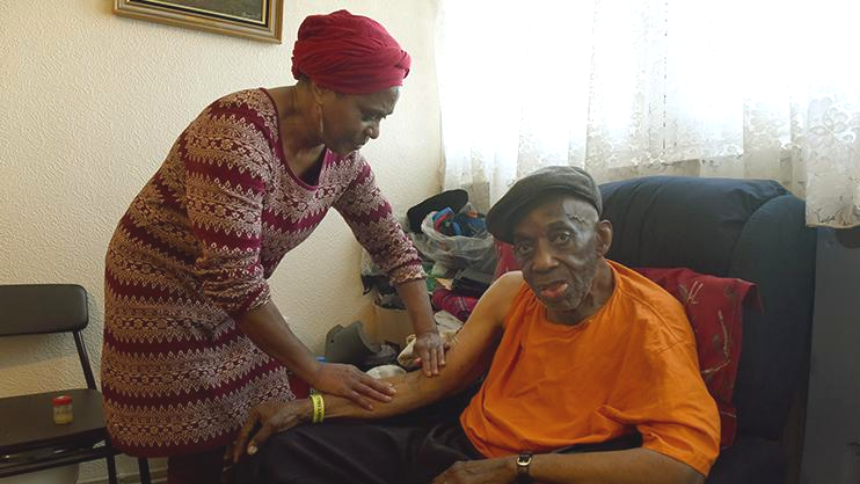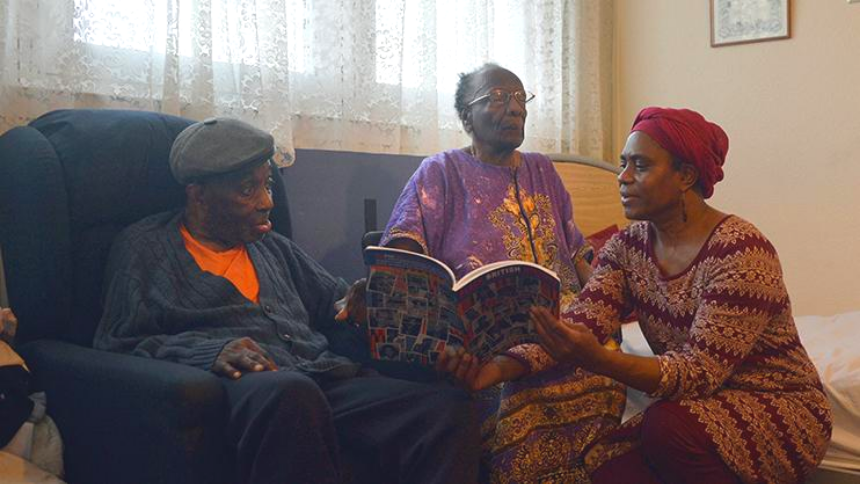Spirit within
We meet volunteers in London providing Namaste care for people with advanced dementia.

St Joseph's Hospice in Hackney, east London, has joined forces with a nearby hospital to provide Namaste care for people with dementia.
Namaste is a term from Hinduism that means 'to honour the spirit within'. Namaste care aims to improve the all-round quality of life of people who are less able to express their needs or desires, providing safety, comfort and stimulation.
Hospital to home
The Namaste approach draws on activities that can include hand massage, music, poetry, making a memory box or simple reminiscence.
St Joseph's Namaste service is provided by volunteers, both on the ward at Newham University Hospital and at the person's home. Carers may also be offered practical, social or emotional support.
'To our knowledge, this is the first volunteer-based project in the UK to provide Namaste care in a hospital ward and continue the service at home, says Lourdes Colclough, Namaste Care Manager at St Joseph's.
'It means people with dementia can receive support in a difficult and stressful hospital environment.'
'Those who might benefit from Namaste care at home could be isolated, struggling to cope or just responding well to sensory activities.'
Kindness and understanding
Volunteers complete intensive training before being matched with a suitable person.
Precious Gordon was inspired to volunteer after seeing the impact of dementia on friends and family.
She says, 'I wanted to make a contribution and thought, "I can do this."
'Often I offer a hand massage, which is well received - they find it relaxing and calming.'
Precious gets to know the person and their family well, which means she can try the right activities for that individual.
'I'll also read uplifting passages from books, maybe even the Bible.'
She's also conscious of the need to support the person's relatives, sometimes offering them massages too.
'It's about treating people with love, kindness, compassion and understanding,' says Precious.
'I am there for the person with dementia but their family are part of that too,' she says.
Precious says the role can be challenging but ultimately very rewarding.
'I feel I can help someone - it's only something that's costing me a bit of time,' she says.
'It's about treating people with love, kindness, compassion and understanding.'
Building trust
One of the couples Precious visits at home is Myrtle Smith and her husband Ralph, who was diagnosed with dementia in 2009.
'When Ralph was in hospital last year, the occupational therapist asked if we would be interested in Namaste care,' says Myrtle.
'Precious comes and gives him a massage if his shoulder hurts. She'll give me one too if I want, with lavender oil. It's good - relaxing.
'She'll also read to me or play us music.'
Ralph has been in and out of hospital in recent times, but Precious still pops in to see Myrtle, who is blind, even helping with important letters or phone calls.
'It's been very good, she'll do anything for me if I ask her,' says Myrtle.
Precious says she has built up a good relationship with Myrtle.
'There's trust there,' she says.
Anything and everything
Another person who has been supported by this service from St Joseph's is 84-year old Pamela Guilfoyle.
Pamela lives with her husband Kevin, 90, and both of them have dementia. They were visited by volunteer Ani, who would take Pamela for walks in the local area during which they reminisced.
'I was very comfortable with her and the walks helped me in temperament,' says Pamela.
'We talked about anything and everything - about my growing up, my parents,' says Pamela.
'It was easy, no halting in the conversation. I was very comfortable with her and the walks helped me in temperament.
'She was very good, very kind and helpful.
Kevin agrees that the walks benefitted his wife, while also giving him some time to himself.
'Ani is a sociable person who was very good at going out with Pam. It gave me a break too,' he says.

Subtle but significant
Lourdes says that many people with dementia who receive Namaste care in hospital find it very beneficial.
'It can provide a much-needed social, spiritual and non-clinical connection in a busy and chaotic ward,' she says.
'The difference is mostly subtle, with moments of significance like the woman who whispered to a volunteer after an injection, "Stay with me, you are my only friend in here."
'Some patients with dementia were also more relaxed and less agitated on the ward. During a Namaste session, one patient stopped saying, "I want to go home."'
Other comments from patients include, 'Thank you - I feel better,' 'I enjoyed that,' and, 'It's lovely.'
The benefits of Namaste can go beyond the sessions, as sometimes a volunteer will teach a carer how to use this approach themselves. Volunteer visits can also lead to a carer being put in touch with other sources of support.
Lourdes says, 'Namaste care offers families a new way of communicating with their relative with dementia, or just some respite from their role.'

